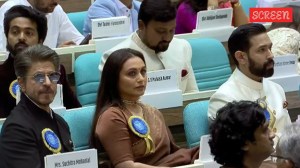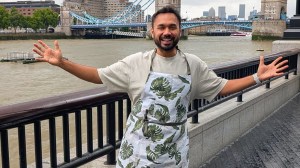I wish we had small Pakistan to knock us into shape, says Ob
NEW DELHI, JANUARY 28: Pakistan's six judges, who refused to bow to Gen. Musharraf's orders to disavow the Constitution yesterday, should ...

NEW DELHI, JANUARY 28: Pakistan’s six judges, who refused to bow to Gen. Musharraf’s orders to disavow the Constitution yesterday, should be “declared global heroes,” Nigerian president Olusegun Obasanjo said here today.
“You must deny dictators’ friendship, approval and respect, because that is what they want the most,” Obasanjo said, attacking the pedestal on which dictators are placed by several liberal-minded nations and individuals on the grounds of following a “realistic” foreign policy.
The Nigerian president, a former general himself who voluntarily gave up power in 1979 and two decades later was elected by his people, spoke at length about the perils of soft-pedalling dictatorial regimes in a conversation with journalists here today.
As the chief guest of India’s 50th anniversary of the Republic yesterday, Obasanjo today left the Capital to visit the Punjab Agricultural University and from there will go to Bangalore and his alma mater, the National Defence College atWellington.
Focussing on Nigeria’s experience, where 29 out of 40 independent years have been spent under military rule, Obasanjo pointed out that the lack of democratic institutions prevented the true devolution of power in the regions at home.
India’s sustained experiment with democracy constituted the essential difference with the Nigerian experience, Obasanjo said, saying that the other major difference was that India has a “constant threat along (its) border which knocks you into shape…I wish we had a small Pakistan to knock us into shape,” he added.
Obasanjo’s emphatic pronunciations on protecting democracy, which he dramatically highlighted at the very end by banging his fist hard on the table, brings home in black and white the fact that many of the world’s poorer nations really don’t have an option but to persist with such an elusive concept, whatever its shortcomings.
He accepted the fact that many of the richer nations, primarily in the West, often tended to look at human rightsviolations in the context of their own interests and not those of the country in which these violations are taking place.
Nevertheless, he pointed out, since this wasn’t a perfect world, “It is enough in the affairs of men and women to have four or five people who will make a difference.”
Within multilateral organisations such as the Commonwealth, he added, there must be “like-minded folks” who pursue such ideals and promised that Nigeria under his leadership would be committed to the democratic principle. If the Commonwealth didn’t stand, he added summarily, “it should be disbanded.”
It was Obasanjo’s intervention at the Commonwealth Heads of Government Meeting (CHOGM) in Durban, South Africa in mid-November, in favour of rapping Musharraf, that seems to have not only given him a much higher profile worldwide but made him especially dear to India.
At a time when the US was, and continues to be, seen by New Delhi to be absolving Pakistan’s new dictator of responsiblity to return to democraticelections, Obasanjo’s spirited intervention at the Commonwealth debate gave new life to what was beginning to be perceived as a peculiarly “South Asian” problem.
Today, however, the eloquence with which the Nigerian president defended this concept was only matched by his plea to reverse the marginalisation of institutions such as the Non-Aligned Movement (NAM), and in fact to reinvent them in the 21st century with new purpose and new ideas.
Photos



- 01
- 02
- 03
- 04
- 05



























